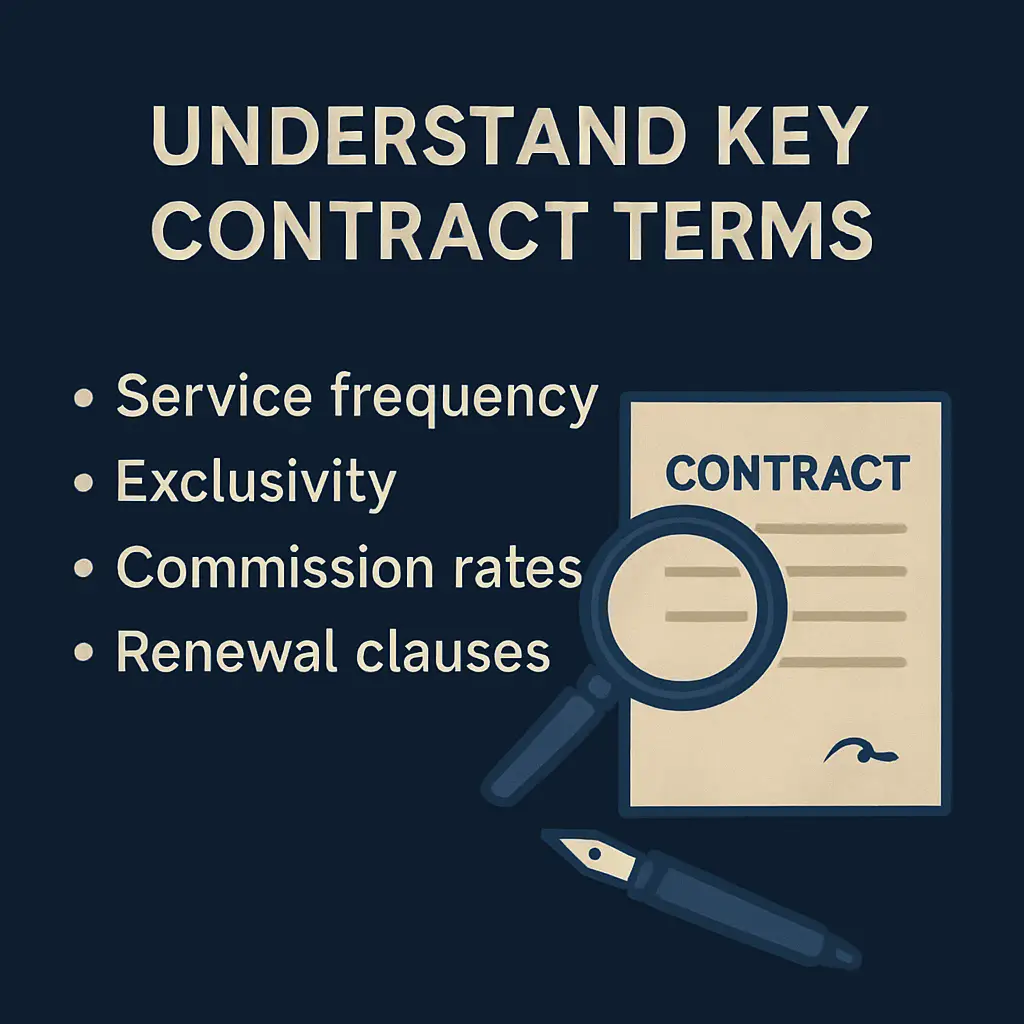Contract Terms with Vending Management Companies
Understand key contract terms such as service frequency, exclusivity, commission rates, and renewal clauses.
Back to Vending Management Companies ResourcesUnderstand key contract terms such as service frequency, exclusivity, commission rates, and renewal clauses.
Back to Vending Management Companies ResourcesFocus on service schedules, product quality expectations, exclusivity clauses, commission rates, and renewal terms. These contract components directly affect your experience, control, and revenue opportunities. Strong contracts ensure vendor accountability and help avoid common frustrations with poor service or expired products.
![]() Clear contracts prevent future service or maintenance disputes
Clear contracts prevent future service or maintenance disputes
![]() Commission terms impact potential revenue from vending machines
Commission terms impact potential revenue from vending machines
![]() Renewal clauses determine vendor accountability and exit flexibility
Renewal clauses determine vendor accountability and exit flexibility

Before partnering with a vending management company, it’s essential to understand key contract terms that define your experience and responsibilities. Many businesses overlook critical clauses, leading to frustrations over poor service, machine downtime, or missed financial expectations. Knowing what to look for can help you choose the right vendor and avoid these costly headaches.
One of the most important terms is service frequency. This outlines how often machines are restocked and maintained. Inconsistent or infrequent servicing often leads to expired products, empty slots, and equipment issues. Ensure your agreement defines how service levels are structured and what’s expected of the vendor.
Exclusivity clauses are another important section. These can limit your ability to bring in additional providers or install alternative equipment. While exclusivity can simplify relationships, it may also lock you into poor service. Evaluate clause terms to see how flexible they are and whether performance guarantees are included.
Many contracts also include commission terms, especially for revenue-sharing vendor models. Be sure to clarify the percentage your business earns, how and when payments are made, and whether minimum revenue thresholds apply. Transparency here avoids future disputes about earnings and finances.
Renewal and termination clauses should also be carefully reviewed. Some vendors include auto-renewal language that makes it hard to switch if you’re dissatisfied. Others may require long notice windows. Look for clear exit pathways and renewal terms that require re-confirmation rather than automatic extensions.
For businesses in hospitality, understanding placement strategy is also crucial. See how vending machine locations affect service in this hotel vending strategy guide. If you're customizing your product mix, offering snack options with protein can improve satisfaction and sales.
If you're exploring vending options for your business, Vending Exchange can help simplify the process. Delivery, Installation and Equipment is provided at no cost to you - vendors provide the machines, keep them stocked, and handle all servicing. Whether you need a provider or full-service management, just fill out the form on this page to get started.
Service frequency refers to how often the vending provider will restock and maintain the machines. It's important for ensuring product availability and equipment reliability.
Some contracts include early termination clauses or penalties, while others require a notice period. Always check renewal and end-of-term language before signing.
An exclusivity clause gives one vendor the sole right to place machines at your location. This can simplify management but may limit future options.
Commissions are usually a percentage of machine revenue paid back to your business. Terms vary, so it’s critical to understand payout schedules and minimum triggers.
Review auto-renew clauses, termination terms, and performance benchmarks. Avoid multi-year contracts without flexibility or evaluation periods.
Not always. Some locations qualify for free service without commissions, while others include revenue-sharing. It depends on factors like location size and traffic.
Exclusivity can simplify vendor management but limits flexibility. Consider vendors with performance-based reviews before granting exclusivity.
If service is poor, your contract should outline penalties or cancellation rights. Clarify maintenance expectations up front to avoid this issue.
Typical contracts range from 1 to 3 years. Some may auto-renew unless canceled within a specified notice period.
Yes, contracts can include product type expectations such as healthy options, beverages, or high-demand snack items. Be sure to communicate any preferences.